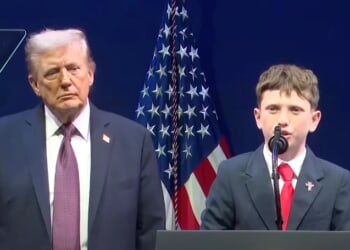The Supreme Court has an opportunity this term to upend secret gender transition policies in over a thousand school districts.
Despite President Donald Trump’s executive order calling for suspending funds for schools that continue to keep parents in the dark and facilitate “social” transitions, many districts aren’t backing down. Several parents urging the Supreme Court to hear their cases could force lasting change if the justices decide to clarify the law surrounding parental rights.
“The issue of school secrecy policies is not only not going away, it promises to be an even bigger problem this year,” Defending Education Vice President and Legal Fellow Sarah Parshall Perry told the Daily Caller News Foundation.
Amid the Trump administration’s crackdown, parents in several districts shared questionnaires teachers gave kids asking for preferred pronouns when the 2025-2026 school year started. In Southern California, one lawyer informed school board members during an August meeting that students have a right to privacy even from their parents, advising them to ignore Trump’s executive orders.
Trump directed agencies to rescind federal funds from schools that “directly or indirectly support or subsidize the social transition of a minor student, including through school staff or teachers or through deliberately concealing the minor’s social transition from the minor’s parents” in a January executive order.
The U.S. Department of Education announced an investigation into California for state law prohibiting school officials from disclosing a child’s “gender identity” to parents, alleging this conflicts with obligations to inform parents under Family Educational Rights Privacy Act (FERPA).
In California’s Santa Ana Unified School District (SAUSD), a current presentation teaching staff how to implement “Identity Support Plans” directs school officials to determine if the student is “out” with family members at home, according to slides obtained by the DCNF.
“Discuss how the student wants to be addressed when family members come to the school for pick up, conferences, IEP meetings, etc,” the presentation by the district’s LGBTQ+ liaison.
READ:
SAUSD IDSP Training 2025 by Katelynn Richardson
Attorney Sarah L.W. Sutherland, the board’s legal counsel, suggested during an SAUSD board meeting that schools should avoid creating documents that could be subject to disclosure.
Following California law that restricts discrimination based on gender identity over executive order exposes them to less legal risk, as enforcing the executive order is “very difficult,” Sutherland told the school board.
“If a student over 12 specifically says don’t share that information, then one of the things is, that then we’re not going to create a record,” Sutherland said in an Aug. 12 presentation. “Because the right of parents is to records … the other part of FERPA is privacy.”
Sutherland did not respond to a request for comment. (RELATED: EXCLUSIVE: Here’s How Parents Can Protect Their Rights As Kids Head Back To School)
“Parents are being deceived on many levels in [California] public education,” Santa Ana Unified School District board member Brenda Lebsack told the DCNF. “We have primary books teaching 5 year olds their gender can change like the weather based on their feelings and if these teachings confuse them into gender fluidity school personnel cannot tell parents unless the child gives them permission. This is upside down, wrong, and a huge betrayal of public trust.”
Petitions to review at least three cases related to secret gender transition policies will reach the Supreme Court this term, Perry told the DCNF.
“More than 12 million children attend schools in a district with express policies that dictate a child’s gender identity information must be hidden from his or her parents under the guise of being required by federal privacy laws,” Perry continued. “Not only is such a position legally inaccurate, it contradicts more than 100 years of Supreme Court jurisprudence determining that parents have a right to direct the education of their children.”
Restoring Parental Rights
January and Jeffrey Littlejohn, whose 13-year-old daughter was socially transitioned in a Florida school district without their knowledge, asked the Supreme Court to take their case in September.
“When the Littlejohns found out and asked the school to stop, the school refused,” their petition states. “When the Littlejohns asked to participate, the school said they had no right. And when the Littlejohns asked for records of the meetings with their daughter, the school said those records were private.”
Massachusetts parents Stephen Foote and Marissa Silvestri, whose daughter was socially transitioned in school behind their backs, also asked the Supreme Court in July to address the “urgent” question their case presents: whether non-religious parents who oppose gender ideology have a right to object.
“Our Constitution’s guarantee of parental rights in a pluralistic society rings hollow for millions of Americans if it offers no protection to nonreligious parents whose children are encouraged to social transition by their public school without their parents’ notice or consent—or over their parents’ vociferous objections,” their petition states.
Despite parents informing the school that they hired a private therapist to help their daughter, officials secretly encouraged her to adopt a “genderqueer” identity and used male name. One teacher who finally disclosed what was happening to the parents was fired, according to the petition.
“More than 1,000 public school districts have adopted secret transition policies, resulting in dozens of lawsuits and harming countless children,” their petition states. “The fact that parents reject gender ideology for non-religious reasons does not leave them without constitutional protection.”
Twenty-one states, along with Guam, filed a brief backing Foote and Silvestri, writing that the Ludlow School Committee’s actions “violated the constitutionally sacrosanct parent-child relationship.” (RELATED: Parents Don’t Have ‘Deeply Rooted’ Right To Trans Their Kids, Appeals Courts Find)
“Our hope is that the court broadly protects parents’ fundamental right to direct their children’s upbringing, education and health care,” Vincent Wagner, senior counsel at the Alliance Defending Freedom’s Center for Parental Rights, told the DCNF. “The way we’ve written the petition and asked the court to weigh in is by teeing it up in the context of these social transition policies.”
If the Supreme Court agrees, it could have a broad effect on secret transition policies nationwide, Wagner said.
Cases like Foote v. Ludlow School Committee pending before the court strike at core constitutional questions, while the administration’s ongoing efforts through the Department of Education seek to enforce statutory obligations under laws like FERPA.
“They have power to really hold school districts responsible for things Congress has told them to do already,” Wagner said. “This isn’t something new. Congress has said you have to give parents access to their own kids’ records.”
Ultimately, they are complementary efforts that both seek to empower parents to be “in charge of their children’s education,” he said.
‘Growing National Importance’
Several justices have already indicated interest in considering the issue.
Justices Brett Kavanaugh, Samuel Alito and Clarence Thomas previously wanted to accept a challenge brought by Wisconsin parents concerned about their district’s policy, but the petition was denied in December by the other six justices.
Alito, in a dissent joined by Thomas, noted the case presented “a question of great and growing national importance.”
An appeals court had dismissed the Wisconsin parents’ case because none of the challengers actually had kids who were socially transitioned under the policy.
The Foote case, however, does not present the same potential issues with standing, as the school acted contrary to the parents’ express wishes by socially transitioning their daughter.
Perry noted the Supreme Court is more likely to take up the matter now, though it “punted on the issue last term.”
“The only end to the proliferation of these nefarious policies is by way of the Supreme Court’s ultimate disposition — something desperately needed in light of educational intransigence and malfeasance across the country,” Perry told the DCNF.
All content created by the Daily Caller News Foundation, an independent and nonpartisan newswire service, is available without charge to any legitimate news publisher that can provide a large audience. All republished articles must include our logo, our reporter’s byline and their DCNF affiliation. For any questions about our guidelines or partnering with us, please contact licensing@dailycallernewsfoundation.org.





![Gavin Newsom Threatens to 'Punch These Sons of B*thces in the Mouth' [WATCH]](https://www.right2024.com/wp-content/uploads/2025/08/Gavin-Newsom-Threatens-to-Punch-These-Sons-of-Bthces-in-350x250.jpg)
![ICE Arrests Illegal Alien Influencer During Her Livestream in Los Angeles: ‘You Bet We Did’ [WATCH]](https://www.right2024.com/wp-content/uploads/2025/08/ICE-Arrests-Illegal-Alien-Influencer-During-Her-Livestream-in-Los-350x250.jpg)








